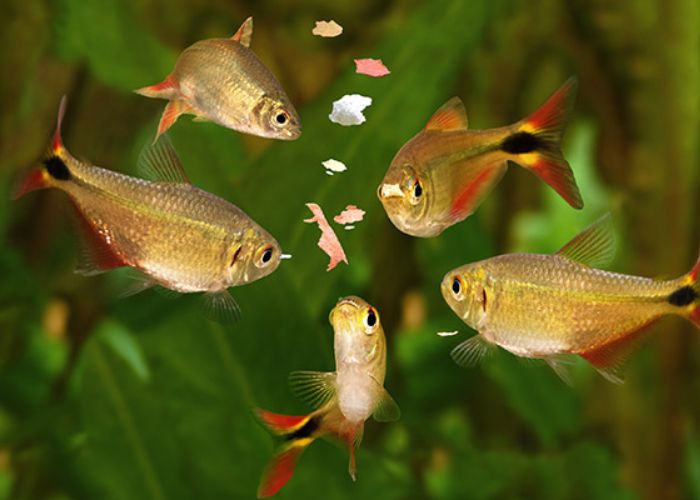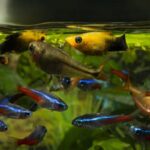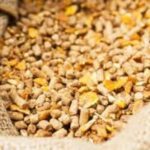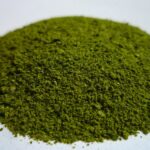In order to create a successful aquarium, it is equally vital to carefully evaluate the food given to the aquatic inhabitants as it is to choose the right tank and décor. The health, growth, and vibrant colours of aquarium fish depend on your providing them with the finest food possible.
This comprehensive guide will teach you all you need to know about the many fish species and their unique dietary requirements so you can keep them healthy. Let’s read below,”What is the best food for various types of aquarium fish?”.
Table of Contents
Understanding the Dietary Needs of Aquarium Fish
Fish in an aquarium, like all living things, require a balanced diet to thrive. What fish require nutritionally can vary greatly depending on factors such as species, size, age, and habitat. The three most prevalent fish diets are omnivore, vegetarian, and meat-eating.
- Herbivores: Fish classified as herbivores typically subsist mostly on algae and plants. In order to digest plant fibres, these fish have developed specialised digestive systems.
- Carnivores: invertebrates, and other fish for their food. Their high-protein, lipid-heavy diets provide the fuel for their strenuous physical activities.
- Omnivores: Fish classified as omnivores consume both plant and animal foods. They need the correct amounts of protein, carbohydrates, and vitamins.
What is the best food for various types of aquarium fish?
In this section, we will examine the many fish species kept in aquariums along with the meals that are most beneficial to them.
Best Food for Herbivorous Aquarium Fish
- Vegetable-Based Pellets: such as certain species of catfish and cichlids. These pellets allow herbivores to graze freely because they sink slowly and contain essential nutrients.
- Algae Wafers: such as plecos and a few species of snails, rely heavily on algal wafers for sustenance. Usually containing a mix of spirulina and other kinds of algae, these wafers provide essential minerals and vitamins.
- Fresh Vegetables: spinach and lettuce are great for herbivorous fish. Before adding the vegetables to the tank, blanch them.
Best Food for Carnivorous Aquarium Fish
- High-Quality Pellets: Carnivorous fish, such as predatory cichlids and Bettas, benefit from pellets that are high in prawns and fish meal. Find pellets that mimic the natural diet of these creatures as much as possible.
- Freeze-Dried or Frozen Foods: brine prawns, and daphnia are popular among carnivorous fish. The actual food they would eat in the wild is very comparable to these options.
- Pellet-Gel Mixes: some fish keepers combine premium pellets with a gel mixture that incorporates vitamins, blended seafood, and other components. This approach ensures that the dish is nutrient-dense and has a variety of flavours.
Best Food for Omnivorous Aquarium Fish
- Flakes: The Best of the Best Omnivore fish, including guppies and tetras, require premium flake food for optimal nutrition. Flakes like these are great for a well-rounded diet because they include a variety of nutrients.
- Freeze-Dried and Frozen Foods: One technique to ensure that omnivorous fish get enough protein and nutrients is to provide them with a variety of freeze-dried and frozen foods. Sea prawns, daphnia, or bloodworms are great options.
- Pellet Mixtures: Pick pellet mixtures that cover all the bases for omnivore fish. Look for dishes that call for both meat and plants.
Considerations for Specific Species
- Goldfish: Goldfish like plant-based diets because they are omnivores. Goldfish do best on a diet that is specifically designed to combine carbohydrates and proteins, like flakes, gel, or pellets.
- Discus Fish: plate fish require a couple of explicit things. They need protein-rich pellets and frozen food sources, like bloodworms, to be sound.
- Tropical Cichlids: tropical cichlids may have different dietary requirements. Pellets, frozen takes care of, and at times live food varieties can be generally used to take care of cichlids, however it means a lot to understand every species’ expectation’s.
Conclusion
Assuming that you believe your aquarium should remain sound, you really want to understand what sorts of food each fish type requires. Giving a changed and adjusted diet to fish in an aquarium can assist them with arriving at their maximum capacity concerning development, hue, and generally speaking well-being.
Regardless of what sort of fish you keep — herbivores, carnivores, or omnivores — the way in to their drawn out well-being is a reasonable eating routine that remembers live or new food varieties for event. With some predictable perception, study, and consideration regarding your fish’s wholesome requirements, you can establish an amphibian climate that is both outwardly gorgeous and environmentally adjusted. I hope you like reading,”What is the best food for various types of aquarium fish?”.

Lena Whitmore is the lead writer at FishClans.com, bringing over 10 years of fishkeeping expertise and a master’s degree in Marine Biology to the site. Her extensive knowledge and practical tips have established her as a respected authority in the aquarist community. Lena’s work has appeared in leading publications and she frequently speaks at industry events.
Connect with Lena and FishClans on Facebook, Pinterest, and Instagram.





